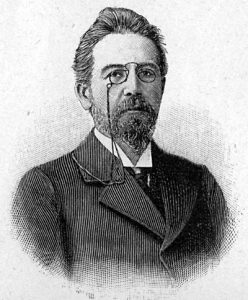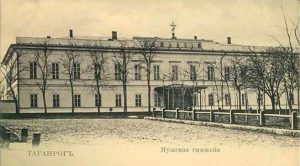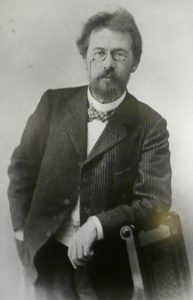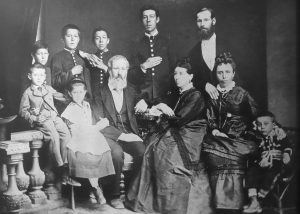Anton Chekhov, a Russian playwright and short-story writer, was a founding father of modern theatre during the late nineteenth and twentieth century. Renowned for his short stories and his impact on the modern short story, his work is highly regarded by public audiences, critics, and writers alike. Scholars find his works to be very approachable, especially to non-Russian audiences, by keeping his plots simple and allowing his audiences to form their own conclusions and perspectives. In his life, Chekhov moved from depressing poverty to wealth in becoming doctor and a leading writer and dramatist of his time in Europe.
Anton Pavlovich Chekhov was born on January 29, 1860 in Taganrog, Russia, the third of six children – three boys and three girls – of Pavel and Evgenia Chekhov. Anton reflects back on his childhood as being “rather gloomy” and his father is at the crux of that sadness (Rayfield, 14). Being a rigorous and abusive father, Pavel instilled his love of Greek monastery choir and Greek education into his son. Recruiting his three eldest sons into his choir of blacksmiths, church became torture for Anton where he and his brothers would often awaken early in the morning for matins and sing at least two long services in the day (Rayfield, 13). For Anton, religion became focused around the music rather than the ideology of the Christian church. In addition, Anton attended gimnazia [grammar school], the parish school connected with the Greek Church of St. Constantine and St. Helen, where he struggled academically in Greek (Rayfield, 15). Anton’s childhood naughtiness and failings resulted in severe beatings from his father. However, his youth was made more troublesome and more arduous when Pavel, after moving his family to the suburbs of Taganrog, employed his sons in grocery store in 1869 (Rayfield, 20). However, various problems involving horrendous hygiene and safety, that had failed to meet with the standards of the era, caused the downfall and eventual failure of Pavel Colonial Store in 1875 (Rayfield, 22). Fleeing from his debtors, Pavel moves to Moscow with the rest of his family following after him in the following months; Anton however, stays behind in order to complete his education. After his graduation in 1879, Anton leaves Taganrog and goes to Moscow, entering the Medical School at Moscow University, graduating in 1884 at the age of twenty-four (Kirk, Chronology).
Although Chekhov eventually gave up his private practice so that he could focus on his writing, his identity concerning medicine still remained essential to him, noting that “medicine is my lawful life and literature is my mistress” (qtd. in Gainor 819) At first, writing was a means for Chekhov to gain extra income while seeing patients, but as his significant talent and resulting popularity grew, his amount of writing greatly increased. Chekhov began his writing career as the author of the handwritten magazine, Zaika [Stammerer], in which he wrote short humorous anecdotes about Taganrog. After seeing Prekrasnaya Elena [Beautiful Helen] in 1873 and writing his first play Bezotzovshchina [Fatherless] in 1877, Chekhov augmented his amount of writing by publishing stories in various magazines and published his own collection of short stories, Skazki Melpomeny [Tales of Melpomene], in 1884 (Kirk, Chronology). By 1888, thanks to multiple writings, including short stories, short plays, and sketches, Chekhov began to garner more fame for his writing career to a point where he was awarded the Pushkin Prize “for the best literary production distinguished by high artistic worth” (Kirk, Chronology). All throughout these years, Chekhov battled ill health, often finding himself coughing up blood. Nonetheless, the Chekhov gained the greatest success after the performance of his play, The Seagull, in the Alexandrinsky Theater in Petersburg in 1896. Although he was downcast about the play’s seeming failure, later performances of The Seagull were immensely successful, especially following the production at Konstantin Stanislavski’s Moscow Art Theater in 1898, bringing Chekhov to the forefront of Russian theatre. Although he was hospitalized the following year for tuberculosis, Chekhov continues to write and produce plays that received much acclaim; Uncle Vanya in 1899, Three Sisters in 1901, and The Cherry Orchard in 1904. However by 1903, his heath had deteriorated greatly, resulting in his death on July 2, 1904.



